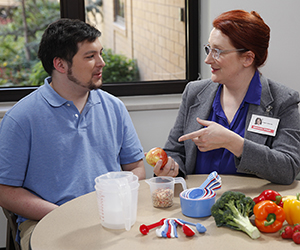Diabetes and Kidney Disease
Diabetes and Kidney Disease
Diabetes makes your body less able to use the foods you eat as sources of energy. As a result, glucose (the form of sugar the body uses as fuel) builds up in the blood. Over time, having too much glucose in your blood can damage blood vessels and kidneys. By controlling diabetes, you can maintain a healthy blood glucose level and slow or prevent kidney damage.
African Americans, American Indians, and Hispanics/Latinos develop diabetes, chronic kidney disease, and kidney failure at rates higher than whites. Patients with diabetes should have their kidney function measured at least once a year with appropriate blood and urine tests. Having diabetes is the most common reason for needing dialysis or a kidney transplant.
Visit your healthcare provider as scheduled.
Follow your diet
To get the most energy from the foods you eat and feel your best, you may have to follow a special diet. Work closely with your healthcare team to design a meal plan that is right for you.
You may also need to:
Eat less protein.
Drink less fluid.
Limit sodium (salt) intake.
Eat foods that are low in phosphorus and potassium.
Take insulin and diabetes medicine as directed
Insulin is a hormone that helps your body use glucose. You may give yourself insulin to increase your body’s supply. Or you may take other medicines to help your body release more insulin or use insulin better. The stage of your kidney disease can reduce the amount of insulin your body needs. So your insulin injections or other medicine may be adjusted. Talk with your healthcare provider if your blood glucose level is often too low. Monitor your blood glucose with a meter as directed by your healthcare provider.
Taking a blood pressure medicine called an ACE (angiotensin converting enzyme) inhibitor, or an ARB (angiotensin receptor blocker) helps people with both diabetes and high blood pressure reduce the risk of getting kidney disease, or worsening existing kidney disease. Studies show these medicines work even in people with diabetes who don't have high blood pressure.
Controlling other risk factors for kidney disease and diabetes will also help slow progression of kidney disease. Smokers should quit smoking as soon as possible. Controlling high blood pressure is also very important. Limiting alcohol consumption will help slow kidney disease. Maintaining a healthy body weight and getting regular activity are also important.
Stay active
Exercise helps the body use glucose. For best results:
Talk with your healthcare provider before starting a fitness program.
Ask your healthcare provider how often you should exercise and for how long.
Your healthcare provider may be able to suggest activities that will help you feel your best.
Eat 1 to 2 hours before you exercise.
Updated:
February 02, 2018
Reviewed By:
Brown, Kim, APRN,Hurd, Robert, MD,Image reviewed by StayWell art team.
